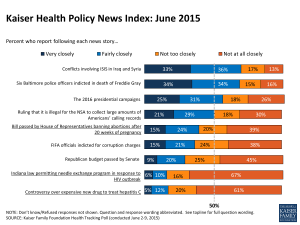
Three-quarters of U.S. adults say the cost of prescription drugs are unreasonable, and blame high medication prices set by profitable pharmaceutical companies according to the Kaiser Family Foundation Health Tracking Poll for June 2015.
Profits made by drug companies are the #1 reason Americans cite among major factors that contribute to the price of prescription drugs (among 77% of people), followed by the cost of medical research (64%), the cost of marketing and advertising (54%), and the cost of lawsuits (49%).
Regardless of the cost, 71% of people say that health insurance should “always” pay for high-cost drugs. At the same time, though, most people (61%) also believe that insurance plans should only pay for a high-cost drug if it proves to be more effective than an existing treatment — illustrating that health plan members are becoming more aware of the concept of cost-effectiveness.  The regulatory approach of government limiting the cost of prescription drugs gets a nod from about 1 in 2 Americans (53%).
The regulatory approach of government limiting the cost of prescription drugs gets a nod from about 1 in 2 Americans (53%).
Health Populi’s Hot Points: I observed above that perhaps patients are morphing into health consumers who may have begun to consider a prescription drug’s effectiveness in the context of cost, with 61% of people saying that health plans should cover high-cost drugs that work better than existing treatments.
 Among all health care costs patients in the U.S. pay for out-of-pocket, prescription drugs represent about 43% of all personal health costs. That’s a significant exposure to medicines in the household health bill, which may account for why consumers over the past decade have been so viscerally negative about the pharmaceutical industry, which has improved from its previous nadir with Big Oil and Big Tobacco (see the third chart). Now pharma’s consumer brand equity sits closer to airlines, financial services, and insurance.
Among all health care costs patients in the U.S. pay for out-of-pocket, prescription drugs represent about 43% of all personal health costs. That’s a significant exposure to medicines in the household health bill, which may account for why consumers over the past decade have been so viscerally negative about the pharmaceutical industry, which has improved from its previous nadir with Big Oil and Big Tobacco (see the third chart). Now pharma’s consumer brand equity sits closer to airlines, financial services, and insurance.
Still, though, with pharma prices paid in part by consumers, the products resemble something like luxury goods, so a reputation/equity closer to that of retail, consumer goods and technology would be useful.
 One more point from the KFF poll is a statistic of caution, shown at the bottom of the bar chart. Some 61% of Americans haven’t heard news about the controversy over expensive new drugs to treat Hepatitis C.
One more point from the KFF poll is a statistic of caution, shown at the bottom of the bar chart. Some 61% of Americans haven’t heard news about the controversy over expensive new drugs to treat Hepatitis C.
As 6 in 10 Americans is largely unaware of the Sovaldi/Harvoni drug pricing story, the sticker-shock statistics captured in the first chart may be a baseline that could grow with consumers’ increasingly exposure to high-cost specialty drugs in 2015, 2016 and beyond.
In the growing value-based and pay-for-performance world of health care overall, pharmaceutical and life science companies would be well-served to craft pricing approaches that bring together payors, providers, consumers and industry to define what a “win” would look like for all parties. This is not an unsolvable problem, but will require greater transparency, humility, and willingness to work across siloes within companies, and across stakeholder groups.




 Interviewed live on BNN Bloomberg (Canada) on the market for GLP-1 drugs for weight loss and their impact on both the health care system and consumer goods and services -- notably, food, nutrition, retail health, gyms, and other sectors.
Interviewed live on BNN Bloomberg (Canada) on the market for GLP-1 drugs for weight loss and their impact on both the health care system and consumer goods and services -- notably, food, nutrition, retail health, gyms, and other sectors. Thank you, Feedspot, for
Thank you, Feedspot, for  As you may know, I have been splitting work- and living-time between the U.S. and the E.U., most recently living in and working from Brussels. In the month of September 2024, I'll be splitting time between London and other parts of the U.K., and Italy where I'll be working with clients on consumer health, self-care and home care focused on food-as-medicine, digital health, business and scenario planning for the future...
As you may know, I have been splitting work- and living-time between the U.S. and the E.U., most recently living in and working from Brussels. In the month of September 2024, I'll be splitting time between London and other parts of the U.K., and Italy where I'll be working with clients on consumer health, self-care and home care focused on food-as-medicine, digital health, business and scenario planning for the future...